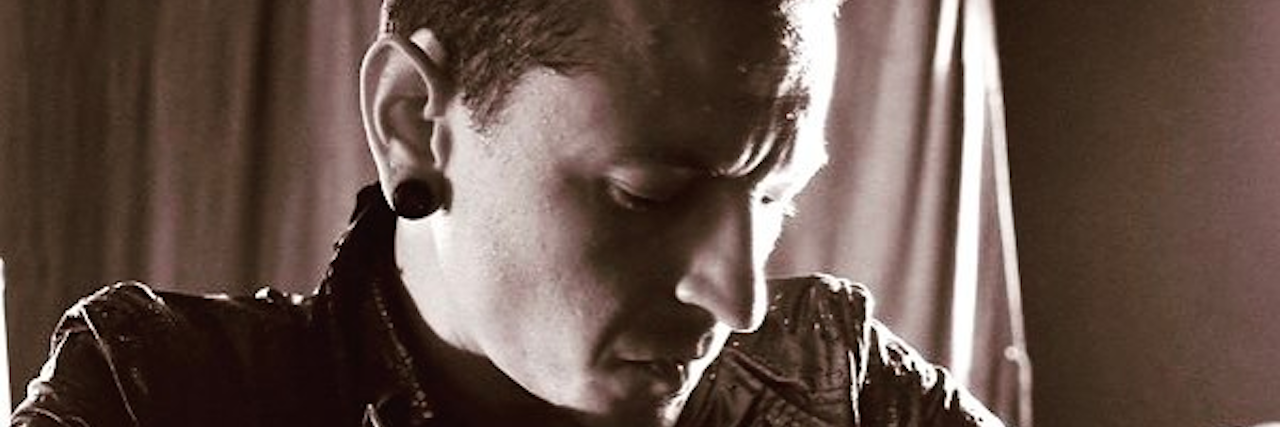I was first introduced to Linkin Park when I was in kindergarten. I didn’t understand any of the words really, but my older brother played their songs constantly, and the tunes sunk in by osmosis. For my sixth birthday, I asked him to burn me a CD (whew, showing my age now) with a mix of what I insisted were my two favorite bands, Linkin Park and The Arrogant Worms. Yeah, I was a bit of a strange child.
Linkin Park slipped off my musical radar for over half a decade while I bopped along to Spice Girls, NSYNC and whatever my friends were listening to at slumber parties. Then, out of nowhere, Linkin Park came rocketing back into my life. They hadn’t released a new album in a few years, but I was in the midst of my first bout of depression – although I didn’t know that at the time – and the upbeat tunes on my ancient blue MP3 player didn’t enchant me like they used to. I had a need, a craving, to hear my pain reflected back to me. Linkin Park met that need. I’d never been one to pay attention to bands, mostly absorbing my music news through my friend Jada’s incessant Green Day updates, but I remember anxiously anticipating the release of “Minutes to Midnight,” pestering my parents about when our next trip to Edmonton was so I could pick it up at the store.
I replayed that CD until it became scratched beyond recognition by my cheap Walmart stereo. For my birthday that year, my brother gave me a knockoff iPod with a black and white checkered case, already loaded with my favorites: Green Day, blink-182, Atreyu, Avenged Sevenfold, Coheed and Cambria and, of course, Linkin Park. By that point, my depression had morphed into an eating disorder and self-harm. It was my biggest secret, my biggest shame, my biggest source of pain — and I felt horribly, horribly alone. The music didn’t cure anything, but it helped. It helped to know I wasn’t the only one whose agony felt so intense that sometimes you just needed to blow your eardrums out and scream.
It’s been 10 years since that album came out. I’m recovering from depression (now diagnosed as bipolar disorder), my eating disorder and self-harm are under control and most days I’m doing OK. Linkin Park had once again slipped off my radar – until yesterday, when I saw the news about Chester Bennington.
It’s a tragedy when any life is lost to suicide. But there’s something extra terrifying about it, to me, when it’s someone older than me. Someone who I thought had their life figured out. I know that suicidal thoughts can impact anyone at any age, and it doesn’t matter how their life looks from the outside. I know that. I teach that when I go into schools and speak about my own experience.
But when I saw the news yesterday, I got the same plummeting feeling in my gut that I got when Robin Williams died three years ago.
So much of my mental health recovery has been based on the fact that I have faith things are going to get better. Maybe not tomorrow or the next day, but someday I’ll feel better. Someday I’ll be able to cope with my emotions. Someday I won’t be shuffled from doctor to doctor. Someday I’ll be able to go a full day without the voices that whisper everyone is better off without me. Someday, someday, someday. The basis of my entire mental health framework is the idea that if I work hard enough, take all the right medications, do all the right therapies — that someday will arrive for me.
So when I see people older than me, people I admire, people I think of as living the someday I’m striving for – when I see them die by suicide, it shakes my faith. What if that someday never comes for me? What if I’m still feeling this way at 30, at 41, at 63? Will I still be able to have confidence in my someday?
I don’t have an answer for that.
But maybe I don’t need one. Because for now, I’m doing OK. For now, I’m breathing. For now, I’m coping. For now, I’m keeping the monsters at bay.
And at the end of the day, someday is just a bunch of “for nows” stuck together, right?
For now, I have to believe that.
If you or someone you know needs help, visit our suicide prevention resources page.
If you need support right now, call the National Suicide Prevention Lifeline at 1-800-273-8255, the Trevor Project at 1-866-488-7386 or text “HOME” to 741-741. Head here for a list of crisis centers around the world.
We want to hear your story. Become a Mighty contributor here.
Lead photo via ChesterBe on Instagram.

